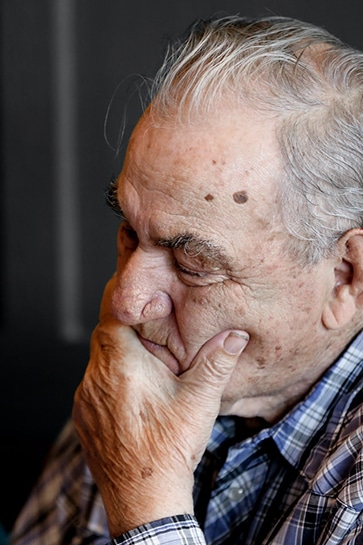


Obsessive-Compulsive Disorder (OCD) can cause those afflicted to feel powerless and overwhelmed. The root of OCD is complicated. A successful solution is equally complex. People living with OCD often need a combination of medication and psychotherapy, especially Cognitive Behavioral Therapy (CBT) and Exposure and Response Prevention (ERP). These tools can help teach a person with OCD how to manage their obsessive thoughts and cope with them without resorting to compulsive behaviors. D’Amore Healthcare ensures a soothing environment to dive into your goals. The skill-building around mindfulness and self-regulation is immediately empowering.
Our Orange County Residential Mental Health Treatment Center takes your entire medical, social, work, trauma, and provider history into consideration. Our courteous and expert staff address each facet of the diagnosis through individual and group sessions, as well as a wide spectrum of therapeutic modalities, to help you find relief and self-soothe. We are a nationally-recognized, licensed mental health facility that has helped individuals suffering from anxiety and OCD find a new road to mental wellness. Our personalized approach is designed to treat the patient as a whole, bringing joy and hope back to the lives of those suffering from Obsessive-Compulsive Disorder (OCD).

OCD can cause constant disruptions to a person’s everyday life, interfering with even the most mundane of tasks. D’Amore Healthcare’s OCD Treatment Program recognizes that this disorder is a severe and debilitating psychiatric condition that requires specialized treatment.
A personalized treatment program is crucial to teach a person with OCD how to manage their symptoms and restore their quality of life. By tailoring our treatment program to each individual, we are able to address their specific symptoms and help them to overcome the impairment that these symptoms can cause. At our Orange County Residential Psychiatric Treatment Center, an individualized treatment program is designed to address each patient’s unique OCD experience.
D’Amore Healthcare is an Orange County mental health treatment center for men and women specializing in the intervention, acute stabilization, and residential treatment of anxiety and Obsessive-Compulsive Disorder. We are a Joint Commission-accredited facility located in sunny Orange County, California.



OCD is a mental health condition in which the afflicted individuals feel an overwhelming urge to perform certain rituals (such as hand washing or checking the oven). Often people with OCD are plagued by constant thoughts, known as “obsessions.” These activities are often irrational and require more than an hour a day. These behaviors are usually a detriment to the individual’s life. Hoarding, severe “germophobia,” and “skin-picking” are all examples of obsessive-compulsive disorder.
People with OCD may try to fight against their obsessions on their own, but this typically increases their levels of anxiety. They feel obligated to engage in these compulsive behaviors in order to ease their stress. A person’s compulsive behavior will usually be closely tied to their obsessive thoughts. Often, they believe that their fears and anxieties can be relieved by performing these compulsive rituals.
For example, a person with OCD may become obsessed with the thought of being contaminated by germs. To alleviate these unwanted thoughts, they may be compelled to wash their hands habitually.
In addition to preoccupations with germs, people with OCD can become obsessed with locking their doors, shutting off their stove, or their belongings becoming disorganized or asymmetrical. The common theme among these seemingly random obsessions is a fear of uncertainty. People with OCD typically doubt their own abilities and actions and need to follow up on them, again and again, to ensure that they have been done. This doubt is further complicated by a heightened sense of responsibility and an inflated estimation of danger.
Because obsessive-compulsive disorder has essentially two components, and because it can be hard to differentiate OCD from character traits such as perfectionism, the signs of OCD can be tricky. A person who has obsessive thoughts about being contaminated by germs, for example, may have a compulsion to wash their hands excessively. A sign, then, might be raw or cracked skin from over-washing. Similarly, a person who is obsessed with order might have a compulsion to organize their bookshelves in an intricate, detailed way (for example, chronologically with the spines facing the same way and a certain distance from the edge of the shelf.)


This is by no means a complete list, and due to the high comorbidity and suicides rates, medical attention to a person with OCD and anxiety disorder is highly recommended. If you or someone you love is suffering from OCD, please don’t hesitate to call today.
Having a fear of contamination or dirt.
Having difficulty tolerating uncertainty and doubt.
Having a need for order and symmetry.
A fear of losing control and harming yourself or others.
The presence of unwanted thoughts, such as aggression, sexuality, or religion.
A person with obsessive-compulsive disorder (OCD) has repeated, uncontrollable thoughts (“obsessions”) and/or behaviors (“compulsions”) that he or she feels compelled to repeat.
Anxiety or stress, or being involved in stressful events such as a car accident or starting a new job, can trigger or worsen OCD. Perinatal OCD is sometimes triggered by pregnancy or giving birth.
Making sure loved ones are safe by checking in frequently. Counting, tapping, repeating certain words, or doing other senseless things to reduce anxiety. Spending a lot of time washing or cleaning. Ordering or arranging things “just so”.
The difference between OCD and perfectionism is how you feel about rituals and behaviors. A perfectionist may fear being called messy by not organizing their closet a certain way, someone with OCD feels a way stronger fear because they didn’t complete a ritual.
Health professionals and doctors test people for OCD, by determining if they have compulsive behaviors or obsessions, talking about symptoms, and by evaluating if the behaviors and thoughts interfere with their daily functions.

Valerie has worked in the medical field for over 8 years and the past 4 years has worked in mental health as a school counselor at an elementary school, therapist at a nonprofit for women and children and a therapist at nonprofit working with homeless adults who suffer from Schizophrenia and Bipolar. Valerie received her MSW at USC and is currently working towards her LCSW.